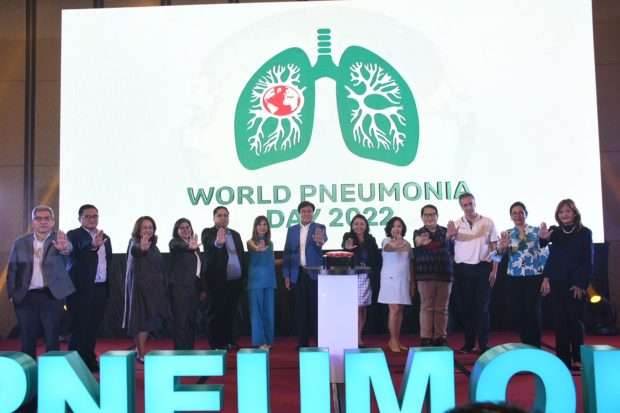For World Pneumonia Day, scientific leaders and decision makers unite in the fight to #StopPneumoniaTogether
Pneumonia remains a serious health issue worldwide. Marked by swelling or inflammation in one or both lungs, pneumonia is usually caused by an infection brought about by exposure to certain bacteria, fungi, and viruses. Pneumonia is a life-threatening disease and remains a leading cause of death among older adults and people with chronic diseases.
Older adults who get hospitalized for pneumonia face a higher risk of death. In fact, 1.13 million people who died from pneumonia were 70 years old and above. And, contrary to popular belief, pneumonia is not exclusive to older adults alone—it can hit children, too. In 2017, 15% of all child deaths globally were due to pneumonia, making it the leading cause of death among children for the year.
While pneumonia can range in seriousness from mild to life-threatening, it can be fatal for infants and young children, people older than 65 years old, and people with chronic health problems or weakened immune systems. In 2021, pneumonia was the seventh leading cause of death in the Philippines.
There are over 30 types of viruses, bacteria, and fungi that can cause pneumonia, but the most common causes of viral pneumonia in the United were influenza viruses, respiratory syncytial virus (RSV), as well as SARS-CoV-2, the virus that causes COVID-19.
United in the fight to stop pneumonia
Everyone has an important role to play in ending pneumonia deaths by 2030.
In celebration of World Pneumonia Day 2022, MSD in the Philippines, Philippine Foundation for Vaccination (PFV) gathered scientific leaders and decision makers in “Championing the Fight to STOP Pneumonia – Together”, a scientific symposium and multi-stakeholder forum held at the ISLA Ballroom of EDSA Shangri-La on November 12, 2022.
The event raises awareness of the importance of disease prevention and urges the public to join the fight to stop pneumonia. The scientific symposium facilitated expert discussions on the issues and challenges of pneumonia prevention, diagnosis, and treatment in the Philippines. Additionally, the multi-stakeholder forum strengthened engagement and collaboration among different stakeholders and advocates who spread awareness and vital information about pneumonia prevention and treatment.
Lowering the risk of pneumonia through vaccination
Vaccination remains one of our most important and cost-effective tools to prevent infectious diseases like pneumonia. It is highly recommended for people who are at high risk for pneumonia, namely: infants under two years old, older adults over 65 years old, people with weakened or compromised immune systems, and people with chronic health conditions that affect the heart and lungs.
According to the Philippine Society for Microbiology and Infectious Diseases (PSMID), pneumococcal polysaccharide vaccines (PPSV) or pneumococcal conjugate vaccines (PCV) are recommended for adults 50 years old and above to prevent invasive pneumococcal diseases.
Protecting our older population from life-threatening diseases through vaccinations is critical to lessen the burden on national healthcare. Every year, a country can spend close to US$27 billion treating adults over the age of 50 for flu, pneumococcal diseases, shingles, and whooping cough, all of which could be prevented through vaccinations.
One can greatly lower their risk of pneumonia through vaccination and other healthy living practices. While vaccination can help prevent pneumonia, good personal hygiene, as well as heart-healthy living, can also lower the risk for pneumonia.
In light of the pandemic, COVID-19 is now considered a primary risk factor for pneumonia and other invasive pneumococcal diseases. As such, pneumococcal vaccination amid the COVID-19 pandemic is now more critical than ever.
For convenience and ease of access, Filipinos can now secure their pneumococcal vaccinations through hospitals and clinics, as well as pharmacies and community drug stores. Pharmacists are now trained and certified to become immunizing pharmacists to expand the network of allied healthcare professionals united against pneumonia. Indigent senior citizens can also get their free pneumococcal vaccinations through the barangay health centers (BHCs) of their local government units (LGUs).
Getting an early diagnosis and proper treatment
Aside from vaccination, early diagnosis is also an important step to save lives against pneumonia. A chest X-ray, which looks for inflammation in the lungs, is often used to diagnose pneumonia. Securing a chest x-ray is a crucial first step, as PhilHealth claims require pneumonia diagnosis to be supported with chest imaging studies and findings.
Getting a blood test, such as a complete blood count (CBC), also helps determine whether your immune system is already fighting a pneumonia infection. As pneumonia can also keep your lungs from getting enough oxygen into your bloodstream, pulse oximetry helps ascertain pneumonia infection. Through pulse oximeters, which are small sensors attached to the finger, pulse oximetry can measure how much oxygen is in your blood.
Aside from securing an early diagnosis, getting appropriate treatment for pneumonia also saves lives. Treatment for pneumonia may include antibiotics, as well as anti-viral or anti-fungal medicine. At the onset of pneumonia symptoms, it is advised to see a doctor and initiate antibiotic therapy. It may take several weeks to recover from mild cases of pneumonia. However, for more severe cases of pneumonia, one may need to be hospitalized to secure oxygen therapy or antibiotic therapy administered through an intravenous (IV) line.
Community-acquired pneumonia is still one of the top illnesses listed in PhilHealth claims. In light of the pandemic, PhilHealth has since extended its coverage to account for probable COVID-19 pneumonia.
Join us in the fight to stop pneumonia
World Pneumonia Day presents a golden opportunity to raise awareness about the burden of pneumonia, and how people can work together to prevent the spread of this vaccine-preventable disease.
This global observance is also a reminder on the importance of engaging multiple stakeholders in an appropriate, coordinated, comprehensive and integrated bold `whole of society` action and response.
Join them in this fight to stop pneumonia. Through concerted efforts to raise awareness and spread timely information about the disease, its prevention through vaccination, early diagnosis, and appropriate treatment, everyone can make pneumonia a thing of the past.
ADVT.
